-
 Bitcoin
Bitcoin $83,009.9241
0.10% -
 Ethereum
Ethereum $1,857.5607
1.81% -
 Tether USDt
Tether USDt $1.0000
0.01% -
 XRP
XRP $2.1129
0.92% -
 BNB
BNB $614.1058
2.33% -
 Solana
Solana $125.4322
-0.51% -
 USDC
USDC $1.0001
0.01% -
 Dogecoin
Dogecoin $0.1686
2.82% -
 Cardano
Cardano $0.6715
3.35% -
 TRON
TRON $0.2346
-0.33% -
 Toncoin
Toncoin $4.0460
1.26% -
 Chainlink
Chainlink $13.7924
2.86% -
 UNUS SED LEO
UNUS SED LEO $9.3060
2.39% -
 Stellar
Stellar $0.2699
1.08% -
 Avalanche
Avalanche $19.1120
1.62% -
 Sui
Sui $2.3837
5.61% -
 Shiba Inu
Shiba Inu $0.0...01268
3.39% -
 Hedera
Hedera $0.1685
3.45% -
 Polkadot
Polkadot $4.1572
3.12% -
 Litecoin
Litecoin $84.0307
2.26% -
 MANTRA
MANTRA $6.2377
-1.12% -
 Bitcoin Cash
Bitcoin Cash $307.8861
2.49% -
 Bitget Token
Bitget Token $4.5268
0.93% -
 Dai
Dai $0.9998
-0.01% -
 Ethena USDe
Ethena USDe $0.9997
-0.02% -
 Pi
Pi $0.7032
0.23% -
 Hyperliquid
Hyperliquid $13.1614
3.37% -
 Monero
Monero $216.8544
0.15% -
 Uniswap
Uniswap $6.0878
2.28% -
 Aptos
Aptos $5.2977
-0.73%
How to safely create a Bitcoin wallet address
Bitcoin wallets store private keys, not Bitcoin; addresses are public for receiving funds, while private keys must be kept secret to prevent permanent loss of access.
Mar 30, 2025 at 11:14 pm
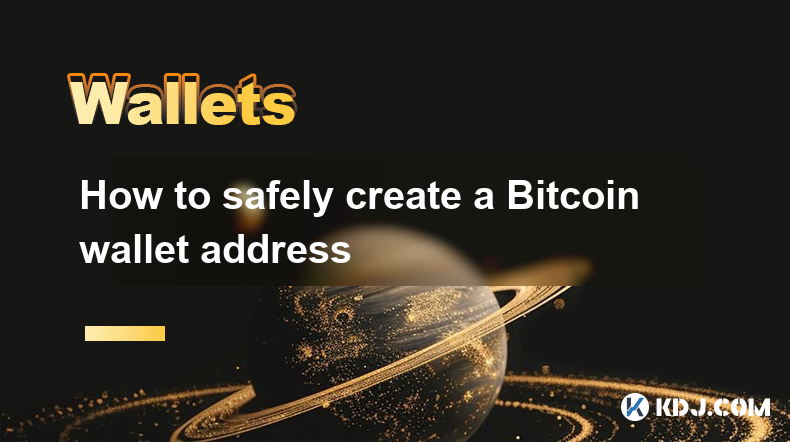
Understanding Bitcoin Wallet Addresses
A Bitcoin wallet doesn't actually store your Bitcoin. Instead, it stores your private keys, which are cryptographic codes that grant you access to your Bitcoin. Your Bitcoin wallet address, on the other hand, is a publicly visible string of characters that others can use to send you Bitcoin. Think of it like your bank account number – you give it to people to receive money, but your private key is like your PIN, which you must keep secret. Losing your private key means losing access to your Bitcoin permanently.
Choosing the Right Type of Bitcoin Wallet
Several types of Bitcoin wallets exist, each with its own security implications. The choice depends on your technical skills and security needs.
Software wallets: These are applications installed on your computer or mobile device. They offer varying levels of security depending on the specific software and its features. Popular options include Electrum and Exodus. Remember to download only from official sources to avoid malware.
Hardware wallets: These are physical devices that store your private keys offline. They are generally considered the most secure option, as they protect your keys from malware and online attacks. Examples include Ledger and Trezor. Always verify the authenticity of your hardware wallet before use.
Web wallets: These are online services that manage your Bitcoin for you. They are convenient but generally less secure than software or hardware wallets because they are accessible through the internet. Only use reputable web wallets with strong security features and a good track record.
Paper wallets: These involve printing your public and private keys on paper. While offering excellent security when stored properly, they are less convenient for regular transactions. Store your paper wallet in a safe, secure location, away from moisture and damage.
Step-by-Step Guide to Creating a Bitcoin Wallet Address (Software Wallet Example)
This example uses a hypothetical software wallet. The specific steps may vary depending on the wallet you choose. Always consult the official documentation of your chosen wallet.
Download and Install: Download the software wallet from the official website. Verify the authenticity of the download using checksums or other verification methods provided by the developer.
Create a New Wallet: Launch the software and follow the on-screen instructions to create a new wallet. You will likely be asked to create a strong password. Choose a strong, unique password that you won't forget. Use a password manager if needed.
Backup Your Seed Phrase: The software will generate a seed phrase (a list of words). This is crucial! Write down your seed phrase on paper and store it in a safe, secure location. Never store it digitally. Losing your seed phrase means losing access to your Bitcoin.
Receive Your Wallet Address: Once the wallet is set up, you'll see your Bitcoin wallet address. This is the address you'll give to others to send you Bitcoin.
Verify Your Address: Before using the address, double-check that it's correct. A single wrong character can result in lost funds.
Security Best Practices for Your Bitcoin Wallet
Strong Passwords: Use strong, unique passwords for all your wallets and accounts.
Regular Software Updates: Keep your software wallets updated to the latest version to benefit from security patches.
Antivirus Software: Use reputable antivirus software on your computer to protect against malware.
Two-Factor Authentication (2FA): Enable 2FA whenever available to add an extra layer of security.
Offline Storage: For long-term storage, consider using a hardware wallet or paper wallet to keep your private keys offline.
Multiple Wallets: Consider using multiple wallets to separate funds for different purposes.
Understanding Private Keys and Public Keys
Your Bitcoin wallet holds two crucial cryptographic keys:
Private Key: This is a secret code that proves your ownership of the Bitcoin. Never share your private key with anyone.
Public Key: This is derived from your private key and is used to generate your Bitcoin address. It's safe to share your public key (your Bitcoin address).
What if I lose my private key?
If you lose your private key, you lose access to your Bitcoin. There is no recovery process. The importance of securely backing up your seed phrase cannot be overstated.
Frequently Asked Questions
Q: Is it safe to use a web wallet?
A: Web wallets are convenient but generally less secure than software or hardware wallets due to their online nature. Use only reputable web wallets with strong security features.
Q: What is a seed phrase?
A: A seed phrase is a list of words that acts as a backup for your private keys. It's crucial to write it down securely and keep it safe.
Q: How do I choose a secure Bitcoin wallet?
A: Consider your technical skills and security needs. Hardware wallets are generally the most secure, while software wallets offer a balance of security and convenience. Web wallets are the least secure option.
Q: What should I do if I suspect my wallet has been compromised?
A: Immediately change your passwords, secure your seed phrase, and contact the wallet provider's support if applicable. Monitor your transactions closely.
Q: Can I recover my Bitcoin if I lose my wallet?
A: If you lose your private key or seed phrase, you cannot recover your Bitcoin. This highlights the importance of securely storing your backup.
Q: Are all Bitcoin wallets the same?
A: No, Bitcoin wallets vary significantly in their security features, user interfaces, and functionality. Research different options before choosing one.
Q: How often should I back up my wallet?
A: Back up your wallet immediately after creating it and regularly thereafter. The frequency depends on how often you use your wallet and how much Bitcoin you hold. Consider backing up your seed phrase at least once a month.
Disclaimer:info@kdj.com
The information provided is not trading advice. kdj.com does not assume any responsibility for any investments made based on the information provided in this article. Cryptocurrencies are highly volatile and it is highly recommended that you invest with caution after thorough research!
If you believe that the content used on this website infringes your copyright, please contact us immediately (info@kdj.com) and we will delete it promptly.
- Expect “Strong Bullish Rally” for SUI if This Key Resistance Breaks: Top Analyst
- 2025-04-01 23:15:11
- MIND of Pepe (MIND) Emerges as a Contender in the Meme Coin Arena, Aiming to Outperform Dogecoin (DOGE) and Pepe (PEPE)
- 2025-04-01 23:15:11
- WAIB Summit Monaco 2025, the First and Largest Web3 Event in Europe
- 2025-04-01 23:10:12
- 5 Best Altcoins to Buy Now as Bitcoin (BTC) Market Cycle Enters a New Phase
- 2025-04-01 23:10:12
- Rexas Finance Surpasses Shiba Inu – Real-World Assets Drive Investor Confidence!
- 2025-04-01 23:05:12
- Kernel DAO (KERNEL) is a Revolutionary Restaking Protocol Operating on the BNB Chain
- 2025-04-01 23:05:12
Related knowledge
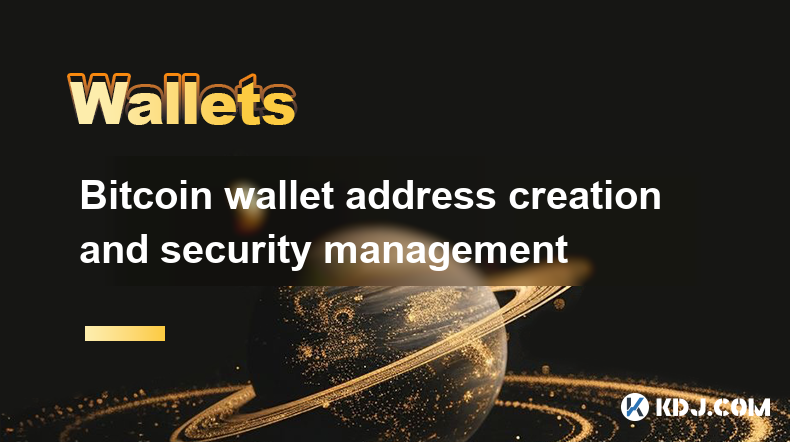
Bitcoin wallet address creation and security management
Mar 31,2025 at 10:56pm
Understanding Bitcoin Wallet AddressesA Bitcoin wallet doesn't store Bitcoin directly. Instead, it stores private keys which are long strings of characters. These keys grant access to your Bitcoin. Your public key, derived from the private key, is used to generate your Bitcoin wallet address, a unique identifier similar to a bank account number. This a...

How to easily generate a Bitcoin payment address
Mar 29,2025 at 10:49am
Generating a Bitcoin payment address might seem daunting, but it's actually quite straightforward. This process is crucial for receiving Bitcoin, as each transaction requires a unique address. Understanding how this works is fundamental to using Bitcoin effectively. This guide will walk you through the simple steps, regardless of your technical experti...

Bitcoin wallet address generation and verification methods
Apr 01,2025 at 11:01am
Understanding Bitcoin Wallet AddressesA Bitcoin wallet address is a unique identifier, similar to a bank account number, used to receive and send Bitcoin. It's a string of alphanumeric characters, crucial for participating in the Bitcoin network. Understanding how these addresses are generated and verified is paramount for secure Bitcoin transactions. ...
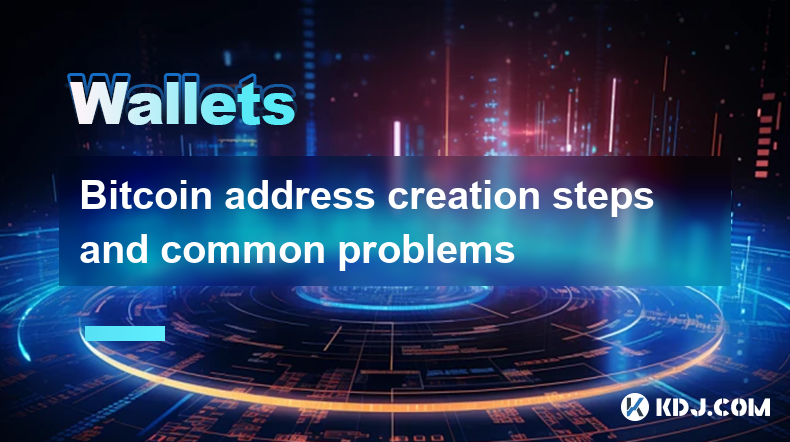
Bitcoin address creation steps and common problems
Mar 30,2025 at 06:07am
Understanding Bitcoin AddressesA Bitcoin address is a unique identifier, similar to a bank account number, used to receive Bitcoin. It's a string of alphanumeric characters generated from a public key, derived from your private key. Understanding the distinction between public and private keys is crucial for Bitcoin security. Your private key should be...
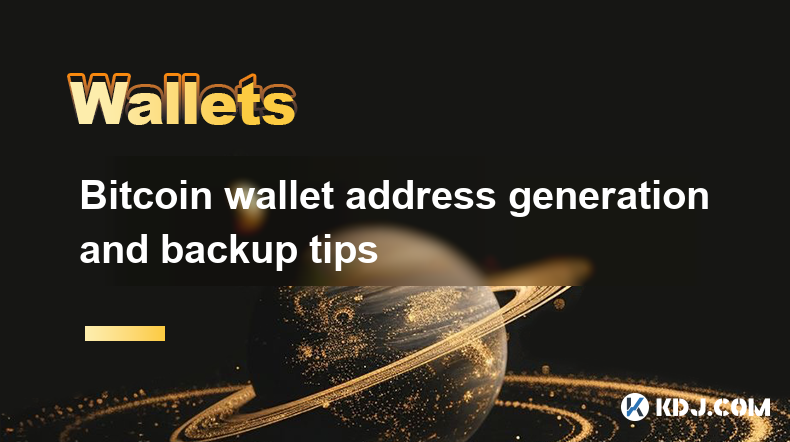
Bitcoin wallet address generation and backup tips
Apr 01,2025 at 05:00pm
Understanding Bitcoin Wallet AddressesA Bitcoin wallet address is essentially your unique identifier on the Bitcoin blockchain. It's a string of alphanumeric characters used to receive Bitcoin. Unlike bank accounts, you can have multiple addresses associated with a single wallet. These addresses are generated by your wallet software using cryptographic...
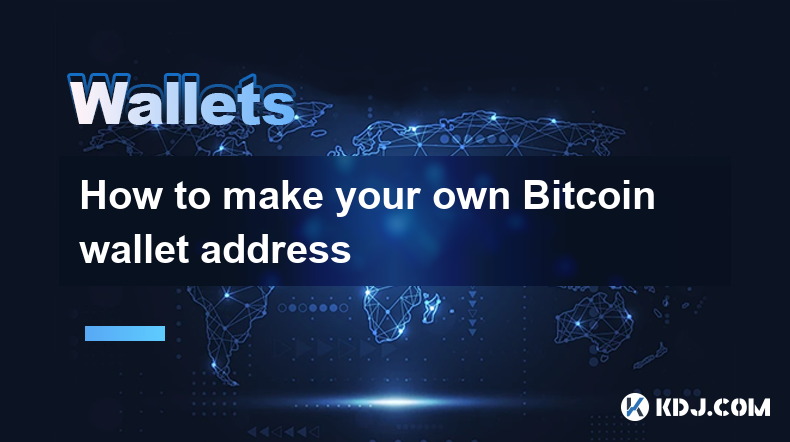
How to make your own Bitcoin wallet address
Mar 29,2025 at 08:42pm
Creating your own Bitcoin wallet address is crucial for securing and managing your Bitcoin holdings. It allows you to independently receive and send Bitcoin without relying on third-party services. This process involves understanding the different types of wallets and choosing the one that best suits your needs and technical expertise. Incorrectly gene...

Bitcoin wallet address creation and security management
Mar 31,2025 at 10:56pm
Understanding Bitcoin Wallet AddressesA Bitcoin wallet doesn't store Bitcoin directly. Instead, it stores private keys which are long strings of characters. These keys grant access to your Bitcoin. Your public key, derived from the private key, is used to generate your Bitcoin wallet address, a unique identifier similar to a bank account number. This a...

How to easily generate a Bitcoin payment address
Mar 29,2025 at 10:49am
Generating a Bitcoin payment address might seem daunting, but it's actually quite straightforward. This process is crucial for receiving Bitcoin, as each transaction requires a unique address. Understanding how this works is fundamental to using Bitcoin effectively. This guide will walk you through the simple steps, regardless of your technical experti...

Bitcoin wallet address generation and verification methods
Apr 01,2025 at 11:01am
Understanding Bitcoin Wallet AddressesA Bitcoin wallet address is a unique identifier, similar to a bank account number, used to receive and send Bitcoin. It's a string of alphanumeric characters, crucial for participating in the Bitcoin network. Understanding how these addresses are generated and verified is paramount for secure Bitcoin transactions. ...

Bitcoin address creation steps and common problems
Mar 30,2025 at 06:07am
Understanding Bitcoin AddressesA Bitcoin address is a unique identifier, similar to a bank account number, used to receive Bitcoin. It's a string of alphanumeric characters generated from a public key, derived from your private key. Understanding the distinction between public and private keys is crucial for Bitcoin security. Your private key should be...

Bitcoin wallet address generation and backup tips
Apr 01,2025 at 05:00pm
Understanding Bitcoin Wallet AddressesA Bitcoin wallet address is essentially your unique identifier on the Bitcoin blockchain. It's a string of alphanumeric characters used to receive Bitcoin. Unlike bank accounts, you can have multiple addresses associated with a single wallet. These addresses are generated by your wallet software using cryptographic...

How to make your own Bitcoin wallet address
Mar 29,2025 at 08:42pm
Creating your own Bitcoin wallet address is crucial for securing and managing your Bitcoin holdings. It allows you to independently receive and send Bitcoin without relying on third-party services. This process involves understanding the different types of wallets and choosing the one that best suits your needs and technical expertise. Incorrectly gene...
See all articles























































































